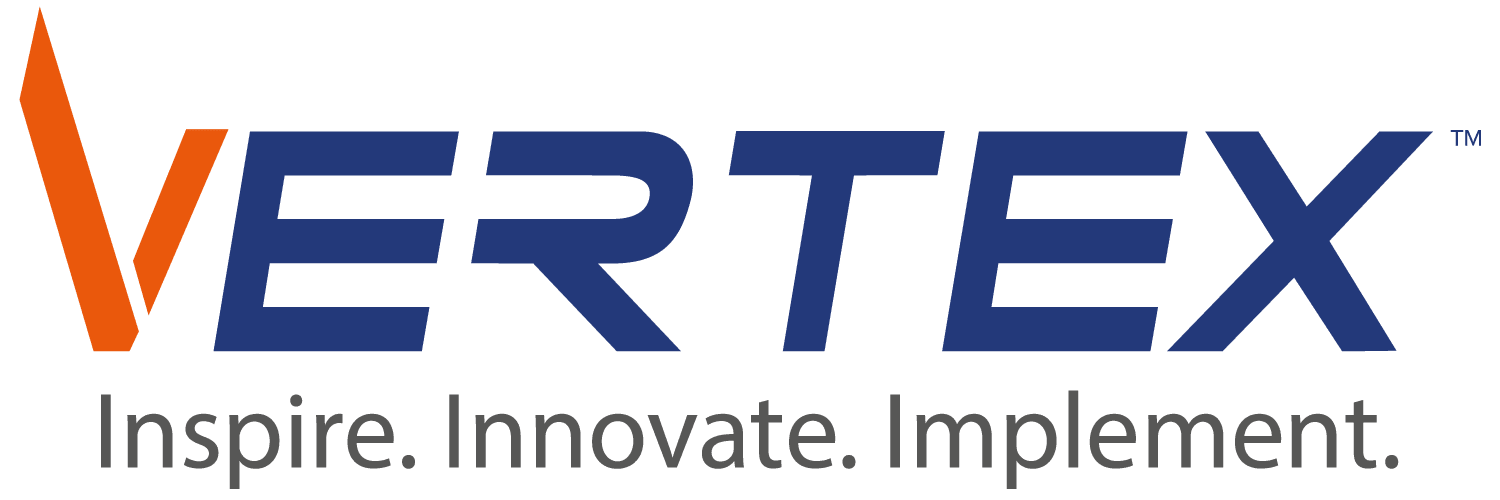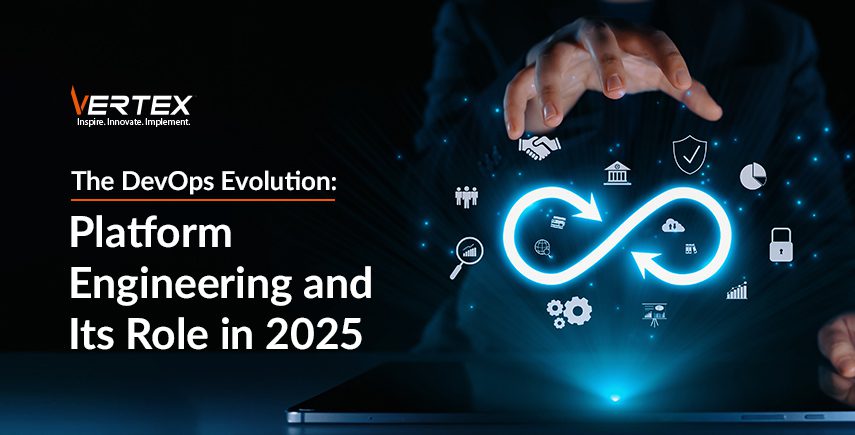
Satish Kulala
April 07, 2025The DevOps Evolution: Platform Engineering and Its Role in 2025
Software development and operations are constantly changing landscapes, driven by the pursuit of efficiency and speed.
In the last decade, DevOps has been the centre of a transformative movement.
In this, they have broken down walls between development and operations and were able to foster collaboration that can automate the software delivery cycle, a feat of its own.
However, that is not enough in today’s time.
Organisations are navigating a much complex cloud-native structure and microservices, and they demand better developer productivity.
This births a new paradigm that is now taking on the space known as Platform Engineering.
Platform Engineering is the next step in DevOps as it offers a structural approach to the underlying complexities of today’s modern software delivery.
This is far from just being a buzzword.
In this article, we will look into the evolution from DevOps to Platform Engineering and will understand what role Platform Engineering plays in today’s organizations and their dynamic field.
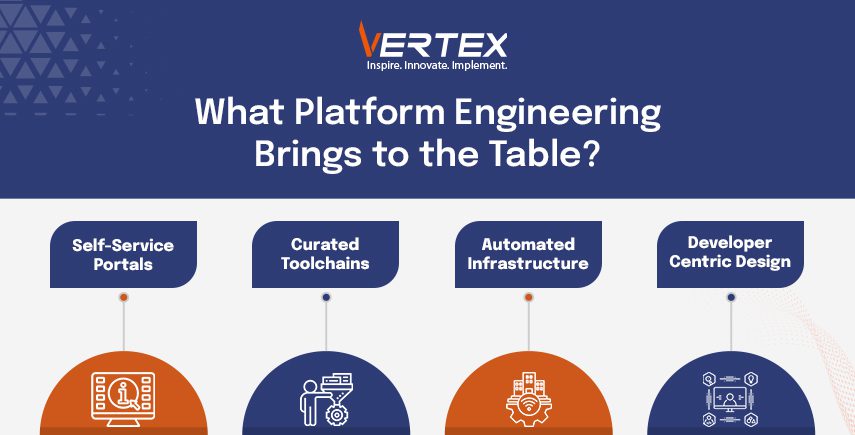
The Evolution from DevOps to Platform Engineering
DepOps core unifies development and operations for faster and more reliable software releases.
Cultural integration and continuous delivery, being the two pillars of DevOps, have been able to provide significant improvements in the past decade.
However, the modern world is moving too fast for DevOps to catch up.
Complex modern IT environments demand more than DevOps can handle; for example, implementing and scaling DevOps across a large, diverse team is challenging because we can now expect every developer to possess deep expertise, and the infrastructure becomes unrealistic, which results in delays and certain bottlenecks.
Platform Engineering is the answer to all the scalability challenges, as it is built upon the core principles of DevOps but with its own layer of abstraction and standardization.
The major difference between DevOps and Platform Engineering is that in Platform Engineering, we do not focus on individual teams and their sets of tools or infrastructure.
Instead, we focus on building self-service capabilities, curated toolchains, and automated infrastructure that simplify the underlying complexity for developers.
In simpler ways, Platform Engineering aims to treat internal developers as customers and to productize the infrastructure and operational tooling.
With this shift, development teams can focus on building a business without worrying about the issues of infrastructure management.
The change from DevOps to Platform engineering is crucial for a well-established, structured, scalable, and developer-centric approach to software delivery.
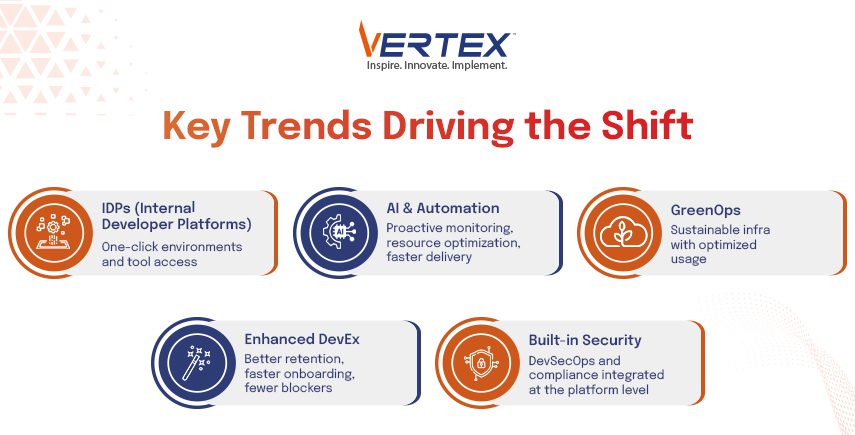
Key Trends Driving the Evolution
The trends that are fueling the Evolution of DevOps to Platform Engineering are mentioned below.
Infrastructure complexities and Cloud-Native Structures:
The frequent adoption of cloud-native technologies, such as Docker and orchestration platforms like Kubernetes, along with microservices, has made working with these technologies complex.
Managing these distributed environments and then delivering the desired results requires specialized skills and tools.
Platform Engineering has the required means through which we can overcome these complexities and help developers by offering them a simplified interface to work and interact with such powerful technologies.
The Need for Enhanced Developer Experience (DevEx):
In today’s time, retaining a talented developer is crucial; a poor developer can bring in a lot of friction and will cause an overload of work, resulting in decreased productivity and dissatisfaction from the stakeholders.
Platform Engineering directly addresses this by providing self-service tools and automated workflows, along with improving DevEx.
DevOps Practices:
When an organisation grows, they have to revisit the implementation of DevOps through the new teams, and this poses a challenge.
However, this is not the case with Platform Engineering; you get a centralized approach with Platform Engineering, and it ensures consistency and best practices for each and every organization.
Enhancing (DevSecOps):
We have to periodically enhance the security of software during its development cycle.
Platform Engineering plays a vital role in implementing security controls in the infrastructure and platforms, ensuring that the development cycle remains unharmed.
Everything (IDPs):
IDPs, or Internal Developer Platform, is a core component of Platform Engineering.
They are used to provide a self-service portal for the developers so that they can use the necessary infrastructure tools.
This reduces the reliance on the operations team for routine tasks, speeds up development cycles, and promises a better developer anatomy.
Artificial Intelligence (AI) and Automation:
Incorporating AI into platforms can automate many tasks, such as infrastructure provisioning, resource allocation, anomaly detection, and incident response.
This will further increase efficiency and reduce manual effort for platform teams.
Infrastructure as Code and GitOps:
Managing code through GitOps provides transparency, control of versions, and automation.
These are helpful in creating a reliable platform with fewer vulnerabilities.
The Role of Platform Engineering in 2025
Platform Engineering in 2025 is going to play a vital role in the development of several industries and organizations, and we have listed some of them for you below:
Simplifying Complexity:
Developers face a major obstacle in the complexity of cloud-native environments.
Overcoming this hurdle is crucial for better efficiency.
Now, Platform Engineering does this by providing developers with a friendly and consistent experience.
This enables them to focus on writing code and delivering features without ever needing deep infrastructure expertise.
Enhancing Developer Productivity:
Platform Engineering offers self-service capabilities, along with automated workflows and curated toolchains.
This lightens the developers’ workloads and makes them more efficient and productive.
Improving Operational Efficiency:
If there are repetitive tasks, Platform Engineering will automate them.
This is simple math, and it saves us resources and time and ensures the reliability and scalability of the underlying infrastructure.
This leads to improved operational efficiency.
Strengthening Security and Compliance:
Platform Engineering can help organisations effectively when they have already embedded security controls and compliance policies into their platform.
This will make the onboarding of DevSecOps practices smoother and with fewer vulnerabilities, ensuring compliance with regulatory requirements.
Enabling Faster Time-to-Market:
After Platform Engineering, the self-service nature of the internal developer and the automation provided help smooth the process of software delivery, enabling organisations to respond more quickly to market demands.
Fostering Collaboration:
Platform Engineering provides a centralized foundation that fosters collaboration between the development and operations teams.
Thus, it provides a common platform and shared understanding of the infrastructure.
Optimizing Costs:
Platform Engineering promotes infrastructure management and resource utilization to the full extent.
This helps in optimizing the cloud and infrastructure costs for the organisation.
Platform Engineering Best Practices
Organisations should comply with these best practices to implement and benefit from Platform Engineering.
- Treat the Platform as a Product: The best practice any organisation can adopt is to treat its internal developers as customers. It should listen to and understand their needs and gather as much feedback as it can. Then, based on the feedback, it should define a clear plan of action that will help the developers reach their goal.
- Focus on Developer Experience: They should prioritize the developer and the experience and ensure self-service portals, clear documentation, and optimized workflows. This will help minimize the load and maximize the developer’s satisfaction.
- Build Self-Service Capabilities: If the developers are provided with self-service tools and infrastructure, then they will not have to rely on the operations teams, and this will accelerate workflows.
- Automate Everything Possible: Try automating all the repetitive tasks, infrastructure provisioning, deployments, and security checks. Automation is the answer for improving efficiency and reliability.
The Future of DevOps and Platform Engineering
If we are to see and talk about the future of DevOps Platform Engineering, then it can be defined by the trends and key aspects mentioned below.
Increased Adoption of AI and Autonomous Systems:
AI incorporation will be over 50%, and there will be automated platform operations, predicting potential issues and optimizing resource utilization.
These systems will be self-enabled and become more prevalent with time.
IDPs will become more intelligent, offering personalized recommendations based on developers’ usage patterns.
Greater Focus on Sustainability (GreenOps):
Sustainable practices in platform engineering will include optimizing resources to the full extent and eliminating the infrastructure’s carbon footprint.
Enhanced Security and Compliance Automation:
Security will be a major concern, and to overcome this concern, AI-powered tools will be available that can detect any possible vulnerability and enforce policy and compliance management.
The future of DevOps is intertwined with the evolution of Platform Engineering, as Platform Engineering provides a framework through which you can achieve your goal of DevOps scaling in environments.
Many say DevOps is being replaced by Platform Engineering.
Well, in my opinion, it is like phasing into an evolved stage of DevOps.
This stage is more focused on building a robust, scalable, and developed platform.
Conclusion
2025 is the year in which Platform Engineering will come on top as the next step in the evolution of DevOps.
The structures and self-service platforms that reduce the complexities of the modern infrastructure empower developers, enhance their operational efficiency, and speed up software delivery.
The future is AI, and its incorporation in IDPs will result in a better path for automation in Platform Engineering.
Platform Engineering is paving the path for better, more secure, and developer-friendly software delivery in the coming year.
Recent Blogs
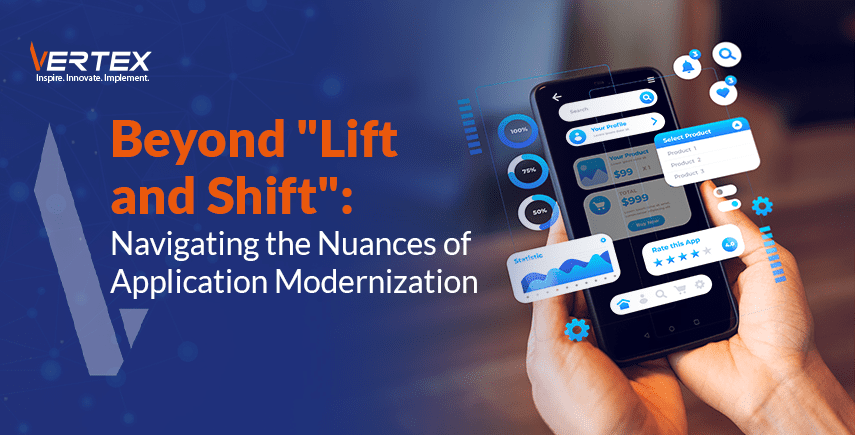
19 May, 2025

19 May, 2025

12 May, 2025

5 May, 2025

28 April, 2025

21 April, 2025
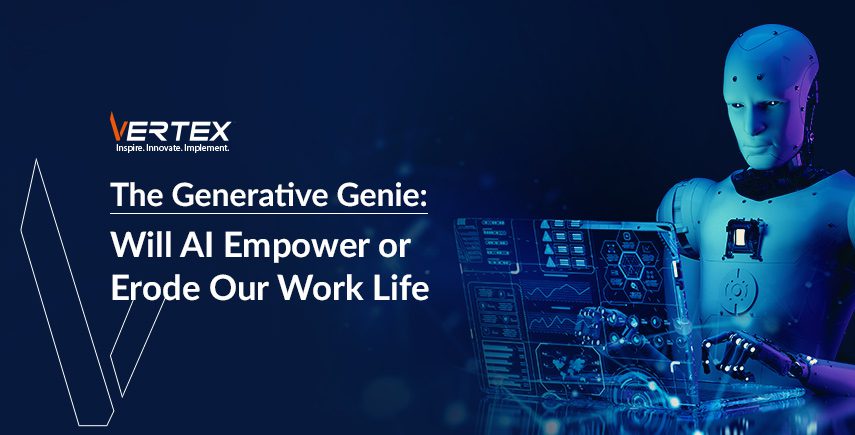
14 April, 2025

7 April, 2025
Recent News

2 February, 2025
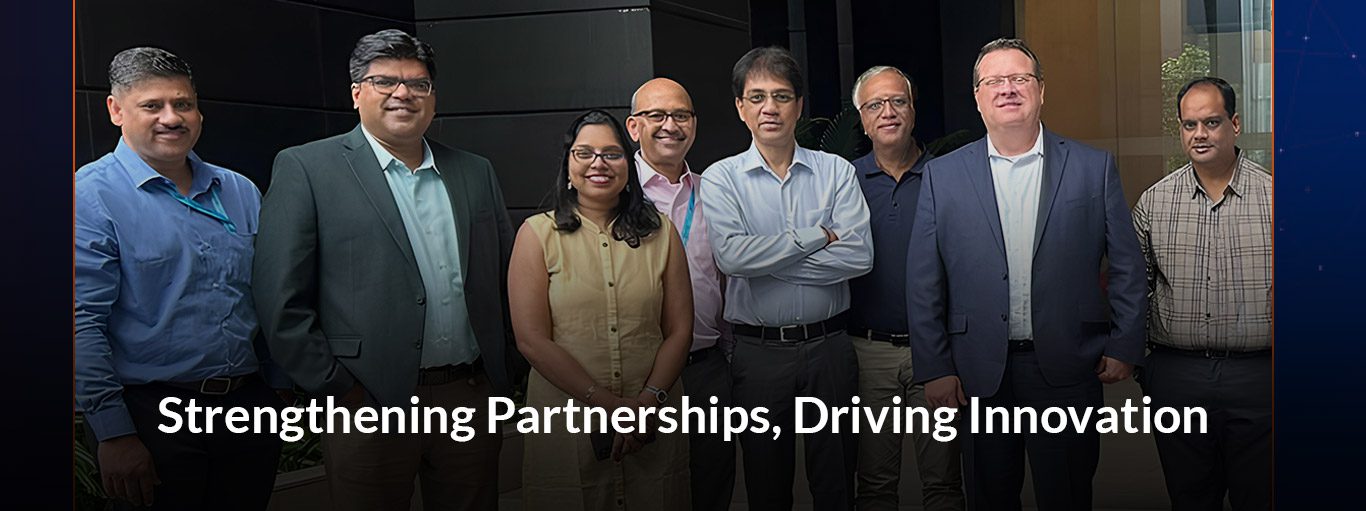
14 November, 2024
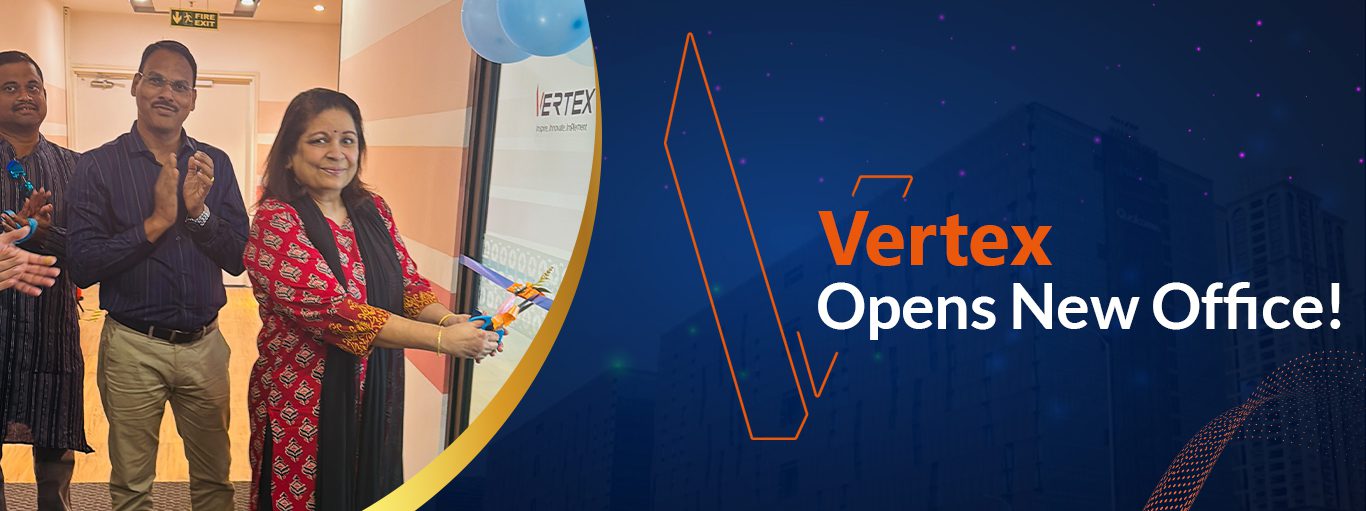
4 November, 2024

1 August, 2024

6 March, 2024

28 February, 2024

12 June, 2023
